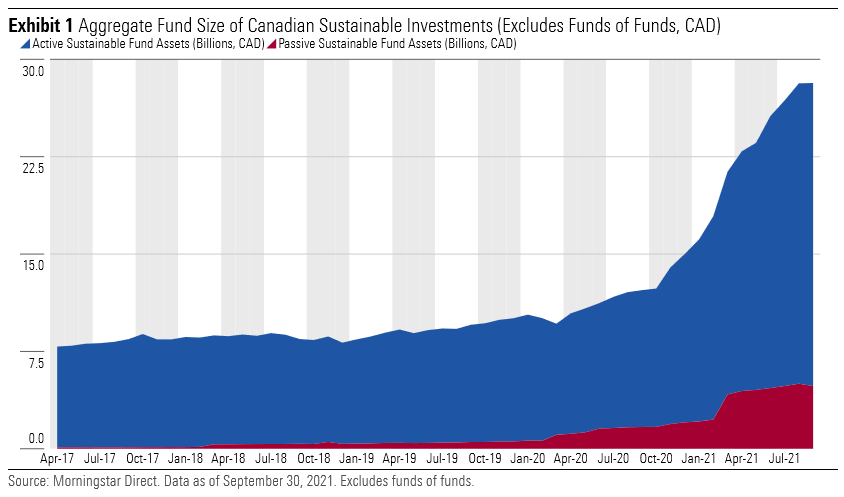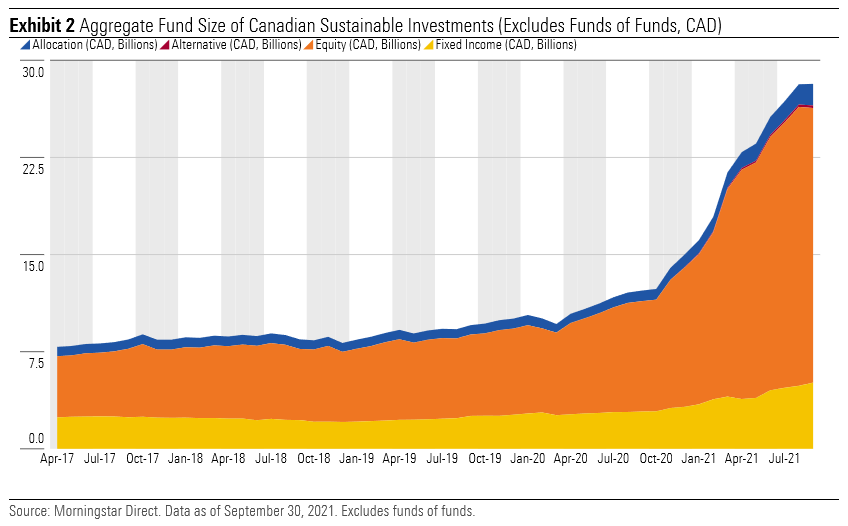
Last quarter was a very good one for sustainable funds in Canada. Though this quarter has also seen inflows, compared to the previous quarter, the growth seems muted, finds Morningstar Canada’s director of investment research Ian Tam in his new report.
“Despite positive inflows and a continued arrival of new sustainable funds and ETFs, the growth of sustainable fund and ETF assets were muted this quarter relative to prior quarters' exuberant growth rates, thanks to market-like performance over the quarter,” he notes in the report.
Tam finds that by AUM, sustainable funds and ETFs topped $28.2 billion, representing a quarter-over-quarter growth rate of 7% and a year-over-year growth rate of 143%. Estimated Net Flows into Sustainable funds and ETFs in Q3 were similar to the prior quarter, at around $2.2 billion.
“The Canadian sustainable fund universe continues to be top-heavy, with seven firms (NEI, RBC, Mackenzie, BMO, Industrial Alliance, Desjardins, and AGF) controlling 80% of sustainable assets, a distribution that reflects similarly in prior quarters. Fourteen new sustainable funds were launched in the third quarter, bringing the year’s total thus far to a whopping 63 new products, exceeding 2020’s product launches (of which there were 46). Of the 14 new products, 6 were launched as ETFs,” Tam said.
Actively managed sustainable investment assets grew by 9% over the quarter while passively managed assets remained relatively flat. Despite consistently positive inflows as will be seen in the next section, the market-like performance of sustainable funds has muted the growth in assets. Active strategies grew by 11% while passive strategies grew by just 3% over the quarter.

 The distribution of investments across asset classes remains largely unchanged with the majority of assets being represented by equities (75%), followed by fixed income (18%), and allocation funds (6%).
The distribution of investments across asset classes remains largely unchanged with the majority of assets being represented by equities (75%), followed by fixed income (18%), and allocation funds (6%).
However, Tam found that over the first three quarters of the year, less than half (65 of 136) of sustainable funds outperformed their respective category averages. “Looking across Morningstar categories, Canadian small/mid-cap equities and Canadian allocation categories are areas where very few sustainable products exist,” Tam said.
At present, Canadian issuers are not currently required by regulation to disclose sustainability-related items, thus limiting the voluntary disclosure of said information to larger issuers with enough resources to do so. This may very well change in the years ahead as the Canadian Securities Administrators very recently announced plans to require Canadian issuers to disclose Scope 1, Scope 2 and Scope 3 greenhouse gas emissions and the related risks, in a comply-or-explain framework. “The proposed requirement is currently out for public comment. These required disclosures will enable investors to make better-informed investment decisions around climate-related risk, which should, in turn, culminate into a wider range of investment funds available to investors in a market that has traditionally exhibited a great deal of home-country bias,” Tam said.
You can download the entire report here.
The Rules of Responsible Investing
Understand how ESG regulations affect investors and managers in our latest report




















